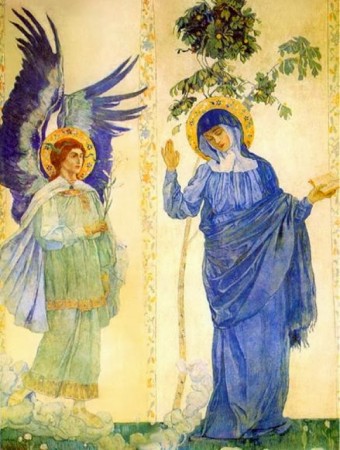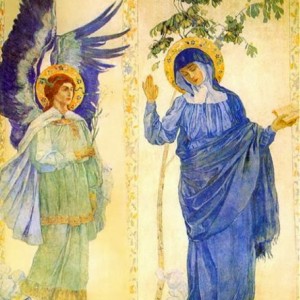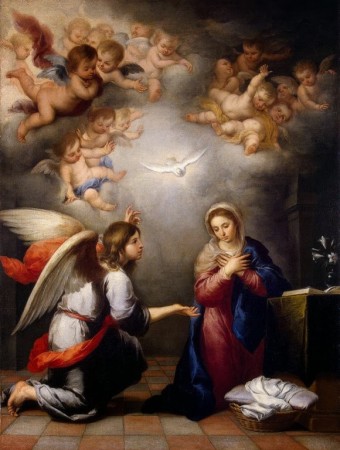 |
| Mikhail Nesterov, The Annunciation (19th c.) |
Christ promises a sort of Trinitarian in-dwelling for those who persevere in love and obedience: “If a man loves me, he will keep my word, and my Father will love him, and we will come to him and make our home with him” (John 14:23). The Immaculate Virgin Mary is the exemplar of this Trinitarian in-dwelling, as we see from the Annunciation.
I am thankful to Fr. Randy Soto, who showed in his homily this morning how the angel Gabriel’s message to Mary consists of three distinct parts (each of which she responds to separately), and relating the Father, the Son, and the Holy Spirit.
Mary and the Father (Luke 1:26-29):
In the sixth month the angel Gabriel was sent from God to a city of Galilee named Nazareth, to a virgin betrothed to a man whose name was Joseph, of the house of David; and the virgin’s name was Mary. And he came to her and said, “Hail, full of grace, the Lord is with you!”
But she was greatly troubled at the saying, and considered in her mind what sort of greeting this might be.
It’s interesting that Mary isn’t described as being troubled the appearance of an angel (which would be normal: Matthew 28:5; Luke 1:13). Rather, Luke says that she was troubled by the saying, and wondered what it might mean. Luke doesn’t tell us why she was greatly troubled, but let me propose one possibility.
The angel calls Mary by the title Kecharitomene, or “Full of Grace,” a reference to her Immaculate Conception (which is why, confusingly, this is the Gospel for the Solemnity of the Immaculate Conception).
And then he tells her, “the Lord is with you,” a reference to Nathan’s message to King David, after the king wanted to build the Temple (2 Sam. 7:3). It was Nathan giving a green light to proceed with the Temple, but has to backtrack on this, after God puts a stop to the plans. Elsewhere, we’re told that this is because the blood on David’s hands made him unworthy to build the temple (1 Chronicles 28:3).
Mary and the Son (Luke 1:30-34):
Bartolomé Esteban Murillo, The Annunciation (1660) And the angel said to her,“Do not be afraid, Mary, for you have found favor with God. And behold, you will conceive in your womb and bear a son, and you shall call his name Jesus.
He will be great, and will be called the Son of the Most High;
and the Lord God will give to him the throne of his father David,
and he will reign over the house of Jacob for ever;
and of his kingdom there will be no end.”
And Mary said to the angel, “How can this be, since I have no husband?”
So having found favor with the Father, Mary is promised that she will bear the Son, Jesus. This raises an obvious question: how can will that occur, given that Mary is a perpetual Virgin?
Mary and the Holy Spirit (Luke 1:35-38):
And the angel said to her,“The Holy Spirit will come upon you, and the power of the Most High will overshadow you; therefore the child to be born will be called holy, the Son of God.
And behold, your kinswoman Elizabeth in her old age has also conceived a son; and this is the sixth month with her who was called barren. For with God nothing will be impossible.”
And Mary said, “Behold, I am the handmaid of the Lord; let it be to me according to your word.” And the angel departed from her.
So Mary finds favor with the Father, bears the Son, and is overshadowed by the Trinity. This is what I mean by saying that she is the exemplar of Trinitarian indwelling: after all, she literally grew the Son of God in her body.
Immaculate Mary, hope of Christians, pray for us!


Joe, Fr. Soto was my thesis director. It was a blessing to come across your post today, especially as it gave me some great material for a presentation I’m doing next Tuesday. Peace.
Hi Joe, please do a post on Mother Mary, the Queen of Heaven. I also want you to explain Jeremiah 44 and it’s use of the phrase. Just want you to reply to those who use it to condemn Catholics for giving Mother Mary the same title; which, of course has a very different meaning to us. Thank you and may God bless you.
This is awesome! Thanks for sharing.
“I am thankful to Fr. Randy Soto, who showed in his homily this morning how the angel Gabriel’s message to Mary consists of three distinct parts (each of which she responds to separately), and relating the Father, the Son, and the Holy Spirit.”
Can you flesh this out for the slow kids in the crowd? Thanks.
A notice reminder.
Martin,
Sure. The angel Gabriel tells her first, that she’s found favor with the Father; second, that she’s going to bear the Son; and third, that she’s going to be overshadowed by the Holy Spirit. St. Luke records Mary’s reaction to each of these three messages (as outlined in the post above). So the Annunciation, in a sense, is both three messages and one, reflecting the Trinity.
I.X.,
Joe
Excellent, thanks.
Daer Joe;
Allow me to share my thoughts, indeed Mary lived a Trinitarian Life starting at the Annunciation.
But before I go to that, Mama Mary was troubled by the greetings of the Angel Gabriel because although Mary perhaps is no stranger to seeing angels because of her purity, but Mama Mary’s humility never knew or don’t even think that Her holiness exceeded even that of angels even an Archangel who is a Cherub.
The Choir of Cherubim knows the secrets of God, angel Gabriel was sent to give God message, but the angel Gabriel gretings was his personal act and not instructed by God. Archangel Gabriel seeing the state of soul of Mary and knowing Her future role as Mother of the King of Kings prompted his actions to bow before the Divine Motherhood their future Queen.
At the Annunciation, Mama Mary is having a deep relationship to Abba Father as her beloved daughter.
Mama Mary accepted first the Father’s Will, the Holy Spirit overshadowed Her and then the Logos was formed in Her most pure womb.
The Trinitarian life was shown to Mary for us to imitate. First we must know & do the Father’s Will, thru receiving the Holy Eucharist we abide in Jesus presence thru intimacy and then the Holy Spirit will empower us to do the Will of the Father expressed in Jesus Words.
Godbless